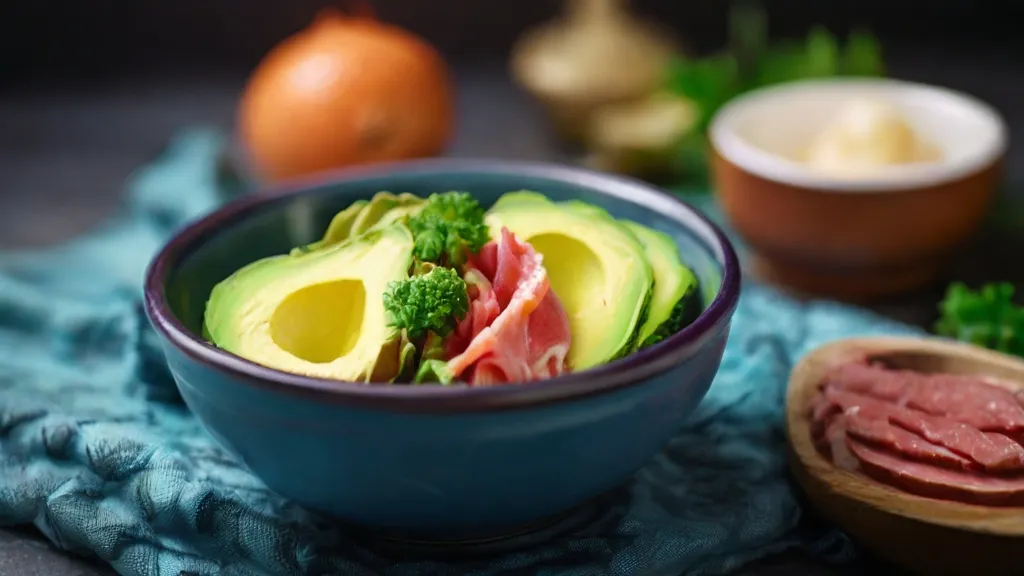Can The Keto Diet Trigger Keto Flu? Learn How To Minimize Symptoms
 Can The Keto Diet Trigger Keto Flu? Learn How To Minimize Symptoms
Can The Keto Diet Trigger Keto Flu? Learn How To Minimize Symptoms
Curious whether beginning on a keto diet can lead to the dreaded keto flu? Not to worry – we've got you covered. The keto flu can be a challenging hurdle for many starting this popular diet, but with the right knowledge and preparation, you can minimize its symptoms and sail through your transition to ketosis smoothly.
Key Takeaways:
- Keto Flu Symptoms: The keto flu may cause symptoms like fatigue, headaches, nausea, and irritability as the body adjusts to ketosis.
- Electrolyte Imbalance: Keto flu is often caused by an imbalance of electrolytes like sodium, potassium, and magnesium. Replenishing these can help reduce symptoms.
- Stay Hydrated: Drinking plenty of water is crucial during the keto flu to avoid dehydration and support the body's adjustment to ketosis.
- Gradual Transition: Transitioning slowly into the keto diet can help minimize the intensity of keto flu symptoms as the body adapts to using fat for fuel.
- Get Sufficient Rest: Rest is vital during the keto flu to allow the body to recover and adjust. Prioritize sleep and avoid overexertion.
The Keto Flu: What Is It?
You may have heard of the term "keto flu" when plunging into the world of the ketogenic diet. But what exactly is the keto flu? The keto flu is a collection of symptoms that some people experience when they first start the ketogenic diet. These symptoms can make some individuals feel under the weather and may deter them from continuing with the diet.
Identifying Keto Flu Symptoms
To identify if you are experiencing the keto flu, look out for signs such as fatigue, headache, dizziness, irritability, nausea, difficulty focusing, muscle cramps, and sugar cravings. These symptoms usually occur within the first few days to a week of starting the keto diet as your body adjusts to using fat for energy instead of carbohydrates.
For instance, when you drastically reduce your carbohydrate intake, your body may go through a phase of low blood sugar levels and dehydration, leading to the symptoms mentioned above. It is vital to differentiate between the keto flu and other illnesses, so consulting with a healthcare professional can help rule out any other underlying issues.
The Science Behind Keto Flu
Identifying the science behind keto flu symptoms can help you better understand why they occur. When you shift from a high-carb diet to a low-carb, high-fat diet like keto, your body goes through various changes. Your body depletes its glycogen stores and starts producing ketones for energy, resulting in a metabolic state known as ketosis. This transition period can cause temporary imbalances in electrolytes such as sodium, potassium, and magnesium, contributing to the symptoms of the keto flu.
Factors Influencing Keto Flu Severity
If you're starting the Keto diet and experiencing symptoms of the Keto flu, the severity of these symptoms can vary depending on several factors.
Carb Withdrawal: The Body's Response
Influencing the severity of the Keto flu is the body's response to the sudden decrease in carbohydrate intake. When you significantly reduce carbs, your body may experience withdrawal symptoms as it adjusts to using ketones for energy instead of glucose.
Individual Body Responses and Genetic Factors
Individual factors such as metabolism, hydration levels, and genetic predispositions can also play a role in how severely you experience the Keto flu.
- Metabolism
- Hydration
- Genetic factors
Knowing your body and understanding how it responds to dietary changes can help you better prepare for and minimize the symptoms of the Keto flu.
If your body is sensitive to drastic dietary changes, it may take longer to adapt to the Keto diet and experience more severe symptoms of the Keto flu. By recognizing these individual responses and genetic factors, you can tailor your approach to the Keto diet to suit your body's needs.
How-To Avoid the Keto Flu
Your journey into the keto lifestyle can be smooth sailing if you take the necessary precautions to avoid the dreaded keto flu. By following some simple strategies, you can minimize the chances of experiencing unpleasant symptoms and make your transition to ketosis as seamless as possible.
Gradual Reduction of Carbs: Easing into Ketosis
Carbs are the main source of fuel for your body, and drastically cutting them out can shock your system, leading to the keto flu. To avoid this, gradually reduce your carb intake over a few weeks instead of going cold turkey. This approach allows your body to adjust to using fats for fuel and can help minimize the symptoms of the keto flu.
Focus on replacing high-carb foods with healthy fats and proteins to ease your body into ketosis. This gentle transition can make a world of difference in how you feel as you make the switch to a ketogenic diet.
Staying Hydrated: Why Water is Important
Any successful keto journey involves staying properly hydrated. Water is necessary for various bodily functions, especially during the initial stages of ketosis when your body is adjusting to burning fat for fuel. Make sure to drink plenty of water throughout the day to avoid dehydration, which can exacerbate keto flu symptoms.
The key to staying hydrated on keto is to listen to your body and drink water whenever you feel thirsty. Additionally, consuming electrolytes can help maintain the delicate balance of minerals in your body and alleviate symptoms of the keto flu.
Tips for Balancing Electrolytes
Many individuals who start the Keto Diet may experience symptoms of the Keto Flu, which can occur as the body adjusts to burning fat for fuel instead of carbohydrates. One way to minimize these symptoms is by ensuring you are maintaining proper electrolyte balance.
The Role of Electrolytes in Preventing Keto Flu
Electrolytes are minerals in your body that carry an electric charge and are imperative for various bodily functions, including nerve signaling, muscle contractions, and maintaining fluid balance. When your body transitions into ketosis, there can be an increased excretion of electrolytes, leading to imbalances that may result in symptoms like fatigue, muscle cramps, and headaches.
Ensuring you have an adequate intake of sodium, potassium, and magnesium can help prevent imbalances and reduce the likelihood of experiencing the Keto Flu as your body adapts to the Keto Diet. Including electrolyte-rich foods in your diet and considering supplementation can be beneficial in maintaining proper levels.
How-To Maintain Electrolyte Balance
Electrolyte balance can be achieved through a combination of diet and supplementation. Including foods high in electrolytes like avocados, leafy greens, nuts, and seeds can help maintain adequate levels. Additionally, using electrolyte supplements or adding electrolyte powders to your water can ensure you are meeting your body's needs.
Plus, staying properly hydrated is key to maintaining electrolyte balance. Hydration aids in the absorption and distribution of electrolytes throughout the body, so be sure to drink enough water, especially as you adjust to the Keto Diet.
Any drastic changes to your diet, such as starting the Keto Diet, can impact your body's electrolyte balance. By being mindful of your electrolyte intake and incorporating these tips into your routine, you can help minimize symptoms of the Keto Flu and support overall well-being on your Keto journey.

Nutritional Strategies to Combat Keto Flu
Unlike the flu caused by viruses, the keto flu is a temporary phase that occurs as your body adjusts to a new way of eating. While not everyone experiences it, there are nutritional strategies you can implement to minimize its symptoms and make the transition to a ketogenic diet smoother.
Keto-Friendly Foods that Help Alleviate Symptoms
The keto flu can lead to symptoms like headaches, fatigue, and muscle cramps. Including keto-friendly foods rich in electrolytes can help alleviate these symptoms. Foods such as leafy greens, avocados, nuts, and seeds are excellent sources of potassium, magnesium, and sodium, which can help replenish electrolytes lost during the initial stages of keto adaptation.
Drinking bone broth or adding sea salt to your meals can also help maintain electrolyte balance. Moreover, incorporating healthy fats like coconut oil, olive oil, and fatty fish into your meals can provide sustained energy and support your body's transition into keto.
What Supplements Can Help?
Combatting the keto flu symptoms may require additional support from supplements. Electrolyte supplements containing potassium, magnesium, and sodium can be beneficial in replenishing lost electrolytes. Additionally, MCT oil is a popular supplement among keto dieters for quick energy and mental clarity.
That said, it's imperative to consult with a healthcare provider or a registered dietitian before starting any new supplement regimen, as individual needs can vary. Proper supplementation combined with a well-rounded keto diet can help ease the symptoms of the keto flu and support your overall health during the transition.
The Importance of Rest and Managing Stress
Despite the many benefits of the keto diet, some people may experience side effects such as the keto flu when transitioning to this low-carb, high-fat eating plan. One critical aspect of minimizing these symptoms is the importance of rest and managing stress.
How-To Prioritize Sleep During Keto Transition
Importance of prioritizing sleep during the keto transition cannot be overstated. Getting adequate rest is crucial for overall health and well-being, especially during this period of adjustment. Aim for 7-9 hours of quality sleep each night to support your body's healing and recovery processes.
Establish a relaxing bedtime routine that includes unwinding activities like reading, gentle stretching, or deep breathing exercises. Avoid screens and stimulating activities before bed to promote optimal sleep quality. Create a comfortable sleep environment with a cool, dark, and quiet space to enhance your restorative sleep.
Stress Reduction Techniques that Work
Prioritize stress reduction techniques that work to help mitigate the impact of stress on your body and mind during the keto transition. Implementing strategies such as meditation, yoga, deep breathing exercises, and mindfulness practices can help lower stress levels and promote a sense of calm.
That said, it's necessary to find what works best for you and incorporate these stress-reducing techniques into your daily routine. Consistency is key when it comes to managing stress effectively, so make it a priority to carve out time for these practices each day.

To wrap up
Now you know that the Keto Diet can trigger the Keto Flu, it may not be the most pleasant experience, but there are ways to minimize its symptoms. By understanding the potential causes and symptoms of the Keto Flu, as well as incorporating strategies like staying hydrated, balancing your electrolytes, and gradually transitioning into the diet, you can help alleviate some of the discomfort associated with this temporary side effect. Keep in mind, the Keto Flu is usually short-lived and a small bump on your journey to a healthier lifestyle.
If you want to learn more about the Keto Flu, its symptoms, and possible home remedies, you can visit Keto flu: What it is, symptoms, and home remedies. Educating yourself about the Keto Flu can better prepare you for any possible challenges that may arise as you commence on your Keto Diet journey.
FAQ
Q: What is the keto flu?
A: The keto flu refers to a range of symptoms that some people experience when starting the ketogenic diet. These symptoms can include fatigue, headaches, nausea, and irritability.
Q: What causes keto flu?
A: Keto flu is believed to be caused by your body adjusting to the changes in your diet, particularly the reduction in carbohydrates and increase in fats. This transition can lead to changes in your electrolyte balance and blood sugar levels.
Q: How long does keto flu last?
A: Keto flu symptoms typically last for a few days to a week as your body adapts to the ketogenic diet. In some cases, symptoms may persist for longer, but most people find that they improve with time.
Q: How can I minimize keto flu symptoms?
A: To minimize keto flu symptoms, make sure you stay hydrated, consume enough electrolytes (like sodium, potassium, and magnesium), get plenty of rest, and consider gradually reducing your carbohydrate intake before starting the keto diet.
Q: When should I see a doctor about keto flu symptoms?
A: If your keto flu symptoms are severe, persistent, or concerning, it's always a good idea to consult with a healthcare professional. They can provide guidance on how to manage your symptoms and ensure that there are no underlying health issues contributing to your discomfort.
Click Here to Find Out Why This Revolutionary Product is Creating Such a Buzz!

